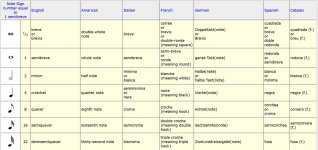So, a few days ago I was listening/watching a YouTube video made by a fellow in the UK ( I guess) who was explaining some music theory as it relates to time signatures. When it came to referring to "quarter notes", he alternatively called them "crotchets". He also had a strange(to me) name for half notes. Would one of you from the UK explain to me the odd difference in musical terminology from the states to the UK ?
Thanks in advance for that.
Thanks in advance for that.


